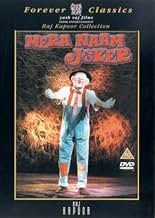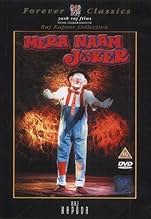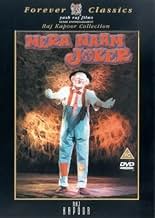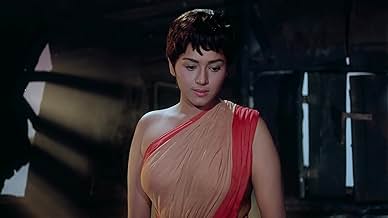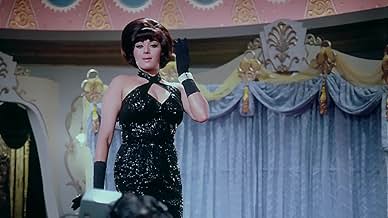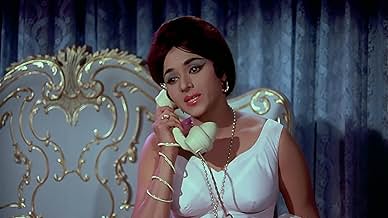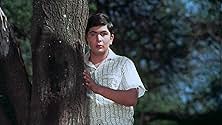Mera Naam Joker
- 1970
- 3h 44min
NOTE IMDb
7,9/10
5,7 k
MA NOTE
Raju fait face à de nombreux obstacles et déceptions dans sa vie.Raju fait face à de nombreux obstacles et déceptions dans sa vie.Raju fait face à de nombreux obstacles et déceptions dans sa vie.
- Réalisation
- Scénario
- Casting principal
- Récompenses
- 11 victoires au total
Achala Sachdev
- Raju's Mother
- (as Achla Sachdev)
Dharmendra
- Mahender Kumar
- (as Dharmender)
Dara Singh Randhawa
- Sher Singh
- (as Dara Singh)
Eduard Sjereda
- Member of the Soviet State Circus
- (as Edward Sereda)
Kseniya Ryabinkina
- Marina
- (as Miss Ksiena Rabiankina of the Bolshoi Ballet, Moscow)
Rajendra Kumar Tuli
- Mahender Kumar
- (as Rajender Kumar)
Rajendranath Malhotra
- Circus Surgeon
- (as Rajendra Nath)
Avis à la une
9Ibuk
I consider Mera Naam Joker to be one of Raj Kapoor's finest movie followed by Sangam. As a child I disliked Mera Naam Joker,I thought it was dull then years later I watched it again and realised how wrong I was. Mera Naam Joker was Raj Kapoor's personal project,he invested millions and millions into MNJ only for it to fail miserably at the box office. Since it's release MNJ is regarded as a cult classic. Looking at the movie you can see where that money went,MNJ has cameos from Bollywood's leading actors:Dharmendra, Simi Garewal, Manoj Kumar,Rajendra Kumar,Dhara Singh and many more. Mera Naam Joker tells the story of a man who is lonely and unhappy and yet he spreads his happiness around the world dressed up as a clown. The music as per usual for a RK production is extraordinary, my favourite is Jeena Yahan Marna Yahn which has a haunting feel to it. It is a real shame that on it's release MNJ didn't get the recognition it rightfully deserves. MNJ is a unique movie experience that will touch people's heart and will remain fixed in their memory forever
Mera Naam Joker is certainly one of the most insightful, heart-warming commercial films made in India. This film shows Raj Kapoor's orientation towards world classics. The cinematography is Tarkovskyish, Raj Kapoor's performance draws heavily from Charlin Chaplin, while the ending reminds of Fellini's Otto e Mezzo. This is possibly the greatest semi auto-biographical film- portrays major part of a person's life. It is the Indian Citizen Kane! Where it stands different from Citizen Kane or Otto e mezzo is its inherent optimism, and its commercial value. Raj Kapoor is not hesitant to show small dances and partial melodrama, and the message is loud and clear- 'Life goes on'! The last story (meena) seems out of place initially in this long film, but starts making sense when it depicts Raju's loneliness correctly.
The scene that steals the show is where Raju's mother dies and yet Raju enters the ring dressed as a clown yelling for his mother, squirts water from his eyes, and starts playing his violin- a wonderful depiction of his showman spirit. This film has everything in place, and I can't help but call it- my favourite Raj Kapoor classic!
The scene that steals the show is where Raju's mother dies and yet Raju enters the ring dressed as a clown yelling for his mother, squirts water from his eyes, and starts playing his violin- a wonderful depiction of his showman spirit. This film has everything in place, and I can't help but call it- my favourite Raj Kapoor classic!
I can't imagine another director who was as in control of his craft as Raj Kapoor was. Mera Naam Joker is an example of superb cinema. You can like or dislike it but people who appreciate cinematic quality will not deny the heart, soul, technique, and the artistic intensity with which it was made. Now, this film is not easy viewing, it is very entertaining, but it requires patience and it is perhaps one of the saddest films one can say. It's not just about particular scenes, it is the melancholy that Kapoor infuses it with. The film is the story of Raju, a famous clown who arrives on stage to give the last performance of his career. His invitees include all his past love interests, each representing a story of either heartbreak or unrequited love, or both, and three main flashbacks presented in three chapters proceed.
Mera Naam Joker could be described as slice-of-life cinema, given how real and detailed an account it is of one man's life, but if taken literally this would be an understatement, because it's a whole lifetime that is recounted in this picture. I'm not sure why Kapoor chose to make this film so sad in story and execution, and I often wonder if it was the outcome rather than his intention. Mera Naam Joker, of course, like many other films by Kapor, has moments of comedy, many such moments actually, but even beneath all of them, there's a deeply poignant foundation. Ironically, among the toughest and most heartbreaking scenes take place within the circus and even during a seemingly funny performance on stage. Some of these scenes are so poignant they really are tough to go through.
The film's first chapter is one of the most beautiful, sensitive portrayals of teenage life, puberty, and first love ever portrayed on screen. The character of Raju, that clumsy but lovable young adult, who has a heart of gold and a vulnerable soul, is a perfect reflection of the older clown. The way his teenage days are depicted, including his falling in love with his teacher Mary, his sexual fantasies, innocence, feelings of guilt, and romantic realisation, are just extraordinary. Rishi Kapoor is absolutely outstanding in this film, in one of the most natural, amazingly raw and unaffected performances one can imagine by a young man his age. His love interest Simi Garewal is wonderful as his caring teacher, and it's easy to see how this teenager fell in love with her given both her physical appearance and the cordial warmth she exudes.
The second chapter, set within a circus where a group of Russian entertainers arrive, is fascinating. First, being a bilingual episode, it is very rare, but the cultural and linguistic contact between the Indian and the Russian group is stupendous. This is where our protagonist meets the beautiful trapezist Marina, and their relationship is so beautifully portrayed and ends on such a touching, heart-wrenching note. Kseniya Ryabinkina is beautiful and radiant and plays really well opposite Kapoor. The third chapter, while clearly not as good as the first two, is also very interesting, but concludes on the most annoying note in relation to the characters' moral stand and Raju's attitude of accepting injustice and moving on. Padmini, the talented actress who was an extraordinary dancer, is fantastic in her part as the young woman pretending to be a man.
It would be fair to say Kapoor was the one filmmaker of Hindi cinema who had this incredible ability to exploit the raw sexuality of his heroines, sometimes by doing so little and without ever making them look vulgar or cheap. Few scenes could compare to the moment Simi Garewal steps out of the river she fell into and the right tip of her dress reveals her leg, the proceeding scene where she is seen undressing in the bushes, or her nude shot in young Raju's fantasies, which is shot brilliantly. The same can be said about the aesthetic brilliance with which Kseniya Ryabinkina is shot, and the moment Padmini reveals her identity as a woman and wears her sari is a scene of extraordinary artistic merit. The women in this film by Kapoor are the epitome of feminine beauty, each in her own way, and much of how well their beauty was captured is to Kapoor's credit.
Under his own extraordinary direction, Raj Kapoor, the actor, shines through. He employs most of his regular gestures and mannerisms, his well-known flamboyance and innocence, but just like with his circus persona, what lies beneath the surface of this amusingly eccentric man is a truly authentic, heartbreaking and compassionate performance of a man who spent his life wanting to make others laugh and never quite got his due. Other than Rishi Kapoor and the extraordinary leading ladies, Rajendra Kumar is there, Dharmendra and Dara Singh make nice appearances, although the best are Achala Sachdev as Raju's mother who fears most that her son would be a clown like his father, and particularly Manoj Kumar, the teacher's cool fiancé who immediately recognises Raju's feelings for his wife and accepts it with full understanding.
The film's narrative style and high production values are never less than excellent. The cinematography is excellent, and the background score keeps tugging at the heartstrings as it enhances the situations and gives life to an otherwise difficult story. The music by Shakar-Jaikishen is a classic of Indian cinema. "Ae Bhai Zara Dekh Ke Chalo", "Kehta Hai Joker Sara Zamana", "Ang Lag Jaa Balma", are all melodious, beautiful numbers brilliantly and soulfully sung by Manna Dey, Mukesh, and Asha Bhosle, respectively. The film's trademark number, of course, is Mukesh's poignant rendition of "Jeena Yahan Marna Yahan". This song pretty much sums up what Mera Naam Joker is, the sad story of a funny clown, a difficult film to watch but an ultimately rewarding experience. This film is a true example of the craftsmanship of Raj Kapoor, a true showman of Indian cinema who reinforced time and again the high quality present in mainstream films.
Mera Naam Joker could be described as slice-of-life cinema, given how real and detailed an account it is of one man's life, but if taken literally this would be an understatement, because it's a whole lifetime that is recounted in this picture. I'm not sure why Kapoor chose to make this film so sad in story and execution, and I often wonder if it was the outcome rather than his intention. Mera Naam Joker, of course, like many other films by Kapor, has moments of comedy, many such moments actually, but even beneath all of them, there's a deeply poignant foundation. Ironically, among the toughest and most heartbreaking scenes take place within the circus and even during a seemingly funny performance on stage. Some of these scenes are so poignant they really are tough to go through.
The film's first chapter is one of the most beautiful, sensitive portrayals of teenage life, puberty, and first love ever portrayed on screen. The character of Raju, that clumsy but lovable young adult, who has a heart of gold and a vulnerable soul, is a perfect reflection of the older clown. The way his teenage days are depicted, including his falling in love with his teacher Mary, his sexual fantasies, innocence, feelings of guilt, and romantic realisation, are just extraordinary. Rishi Kapoor is absolutely outstanding in this film, in one of the most natural, amazingly raw and unaffected performances one can imagine by a young man his age. His love interest Simi Garewal is wonderful as his caring teacher, and it's easy to see how this teenager fell in love with her given both her physical appearance and the cordial warmth she exudes.
The second chapter, set within a circus where a group of Russian entertainers arrive, is fascinating. First, being a bilingual episode, it is very rare, but the cultural and linguistic contact between the Indian and the Russian group is stupendous. This is where our protagonist meets the beautiful trapezist Marina, and their relationship is so beautifully portrayed and ends on such a touching, heart-wrenching note. Kseniya Ryabinkina is beautiful and radiant and plays really well opposite Kapoor. The third chapter, while clearly not as good as the first two, is also very interesting, but concludes on the most annoying note in relation to the characters' moral stand and Raju's attitude of accepting injustice and moving on. Padmini, the talented actress who was an extraordinary dancer, is fantastic in her part as the young woman pretending to be a man.
It would be fair to say Kapoor was the one filmmaker of Hindi cinema who had this incredible ability to exploit the raw sexuality of his heroines, sometimes by doing so little and without ever making them look vulgar or cheap. Few scenes could compare to the moment Simi Garewal steps out of the river she fell into and the right tip of her dress reveals her leg, the proceeding scene where she is seen undressing in the bushes, or her nude shot in young Raju's fantasies, which is shot brilliantly. The same can be said about the aesthetic brilliance with which Kseniya Ryabinkina is shot, and the moment Padmini reveals her identity as a woman and wears her sari is a scene of extraordinary artistic merit. The women in this film by Kapoor are the epitome of feminine beauty, each in her own way, and much of how well their beauty was captured is to Kapoor's credit.
Under his own extraordinary direction, Raj Kapoor, the actor, shines through. He employs most of his regular gestures and mannerisms, his well-known flamboyance and innocence, but just like with his circus persona, what lies beneath the surface of this amusingly eccentric man is a truly authentic, heartbreaking and compassionate performance of a man who spent his life wanting to make others laugh and never quite got his due. Other than Rishi Kapoor and the extraordinary leading ladies, Rajendra Kumar is there, Dharmendra and Dara Singh make nice appearances, although the best are Achala Sachdev as Raju's mother who fears most that her son would be a clown like his father, and particularly Manoj Kumar, the teacher's cool fiancé who immediately recognises Raju's feelings for his wife and accepts it with full understanding.
The film's narrative style and high production values are never less than excellent. The cinematography is excellent, and the background score keeps tugging at the heartstrings as it enhances the situations and gives life to an otherwise difficult story. The music by Shakar-Jaikishen is a classic of Indian cinema. "Ae Bhai Zara Dekh Ke Chalo", "Kehta Hai Joker Sara Zamana", "Ang Lag Jaa Balma", are all melodious, beautiful numbers brilliantly and soulfully sung by Manna Dey, Mukesh, and Asha Bhosle, respectively. The film's trademark number, of course, is Mukesh's poignant rendition of "Jeena Yahan Marna Yahan". This song pretty much sums up what Mera Naam Joker is, the sad story of a funny clown, a difficult film to watch but an ultimately rewarding experience. This film is a true example of the craftsmanship of Raj Kapoor, a true showman of Indian cinema who reinforced time and again the high quality present in mainstream films.
Mera Naam Joker will always leave a lasting impression on me. The story was loosely based on Raj Kapoor's life & is a tale of divided into 3 chapters (as the joker would say the 1st chapter representing childhood, the 2nd youth & the 3rd ultimately old age). The film tells the story of a man searching for love, giving his heart & soul to entertain the world asking only for the world to have a place in its heart for him. His philosophy prevents him from showing the negative human emotions as the joker lives for the audience applause he can only laugh at the hardships in life, never allowed to shed a tear in sadness.
A scene that sums this up is when Raju (Joker) loses his mother to a heart attack (when she discovers her son has taken up the profession which killed her husband in a stunt that went horribly wrong). But as they say in showbiz the show must go on. Therefore Raju has no time to mourn for the mother who had supported him all his life. Carrying the guilt that he may have directly caused his mothers death he returns to the stage to his adoring public. However the heartache he feels overwhelms him & in a fit of total despair & loss he cries out 'Maa (mother) Maa'. As the circus clears Raju is the only person left standing alone with empty seats surrounding him. Kapoor effectively pulls off the act of shear desolation shielded by a veil of self-ridicule to really give you an impression of the inner torment that Raju eventually succumbs to.
If you are prepared to ignore the flaws in the film such as the over melodramatic parts (which there are plenty of) & prepared to watch the full 4 hours you should find Mera Naam Joker thoroughly consuming & invaluable insight into the life & relationships of an actor few have surpassed in the Indian film industry.
A scene that sums this up is when Raju (Joker) loses his mother to a heart attack (when she discovers her son has taken up the profession which killed her husband in a stunt that went horribly wrong). But as they say in showbiz the show must go on. Therefore Raju has no time to mourn for the mother who had supported him all his life. Carrying the guilt that he may have directly caused his mothers death he returns to the stage to his adoring public. However the heartache he feels overwhelms him & in a fit of total despair & loss he cries out 'Maa (mother) Maa'. As the circus clears Raju is the only person left standing alone with empty seats surrounding him. Kapoor effectively pulls off the act of shear desolation shielded by a veil of self-ridicule to really give you an impression of the inner torment that Raju eventually succumbs to.
If you are prepared to ignore the flaws in the film such as the over melodramatic parts (which there are plenty of) & prepared to watch the full 4 hours you should find Mera Naam Joker thoroughly consuming & invaluable insight into the life & relationships of an actor few have surpassed in the Indian film industry.
I first saw this movie when it was first released in the cinemas in 1970. The movie shows the life of a clown, who has gone through many ups and downs in his life. As a child he is infatuated by his teacher, Mary but due to being poor he has to try and help his mother by acting like a clown. He finds out that his father was a clown in circus and that he is killed in an accident. He is finally expelled from school despite objections from the teacher. On his departure, he is informed that the teacher is leaving and is getting married and that her fiancé wants him to be his best man. At the same time, he is handed back a doll of a clown, which he had once given to his teacher. The next part is when he grows up and meets some Russian circus artists and decides to try and join them. During this time he falls in love with a female trapeze artist and despite language barrier he dreams of marrying her. but soon his mother, on finding out his real job, dies during one of his performances and he decides that life has to go on. But the circus closes and the artists return. Once again, he is handed the doll back The third and the final part is where he meets a dancer, Meena, who has to dress up as a boy in order survive. They fall in love and do many shows during which time, he informs her that he hates liers and leaves her for a while. Upon his return he gives her his doll. But soon this is returned when Meena finally finds a man with whom she thinks she will find fame with. The movie has a multistarcast, including Raj Kapoor himself. It is also partly based on his life. The music is provided superbly by Shankar Jaikeshen and the songs are meaningful and with emotions and are sung by the late Mukesh. Even after all these years, when I listen to the songs, I still find them full emotions but still fresh as ever and especially:"Jeena Hana Marna Hana" and Jane Kahan Gaye Woh Din." They say that Mukesh was Raj Kapoor's voice on the screen and this movies proves it. On the whole this is one movie that is worth to watch.
Le saviez-vous
- AnecdotesRaj Kapoor put in his own money in the film also mortgaged his house, The film took 6 years to complete and was a big loss.
- Citations
Raj 'Raju' Ranbir: In this world, the only things more dangerous and scary than a tiger are poverty and hunger.
- Crédits fousat the end of the cast list.........: ".......with a cast of thousands"
- ConnexionsReferenced in Swarg (1990)
- Bandes originalesJeena Yahaan Marna Yahaan Iske Siva Jaana Kahaan
Lyrics by Shailendra
Music by Shankarsingh Raghuwanshi and Jaikishan Dayabhai Panchal (as Shankar-Jaikishan)
Sung by Mukesh
Meilleurs choix
Connectez-vous pour évaluer et suivre la liste de favoris afin de recevoir des recommandations personnalisées
- How long is Mera Naam Joker?Alimenté par Alexa
Détails
- Durée3 heures 44 minutes
- Couleur
- Rapport de forme
- 1.44 : 1
Contribuer à cette page
Suggérer une modification ou ajouter du contenu manquant


